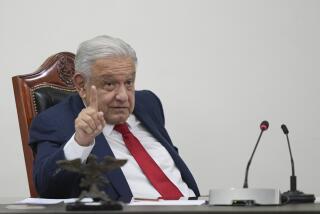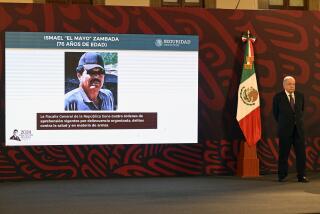Bush and Fox Are Intent on New Era
They face constraints that limit prospects for immediate results, but President Bush and Mexican President Vicente Fox appear determined this week to begin remaking the U.S.-Mexican relationship in ways that could have powerful repercussions for both countries in coming years.
Each side has played down the chances of breakthroughs on key issues such as migration, and the focus will be on pomp and ceremony after Fox’s arrival Tuesday in Washington for the first state visit of Bush’s administration. Domestic politics on both sides of the border and the forces of history work against instant agreements.
But the combination of a Mexican president with unprecedented political legitimacy and a U.S. president from a border state who feels comfortable with Mexico creates a timely opening for teamwork on big strategic issues. Both presidents have said they don’t want to miss the opportunity.
The 2,000-mile border, fraught with social and environmental problems caused by soaring, uncontrolled growth, could become a focal point for initial progress. Mexico will propose a joint border development planning commission to handle such thorny problems as managing scarce water supplies and building new bridges to accommodate the drastic increase in trade since the North American Free Trade Agreement took effect in 1994.
“NAFTA-plus” is how Mexican Deputy Foreign Minister Enrique Berruga describes the next phase of the relationship.
According to Harvard University professor Jorge Dominguez, author of a new book on U.S.-Mexican relations: “The audaciousness of the 1980s changed the commercial relationship. Now, the audaciousness of the Bush and Fox administrations is changing the bilateral agenda. This is an extraordinary moment for U.S.-Mexican relations.”
But Dominguez said the friendship between two rancher presidents will not be enough.
“Only by creating new rules and new institutions will the change be consolidated,” he said.
Efforts are certain to be plagued by political sniping in Mexico and the United States. Many Mexicans are leery of growing too close to the powerful U.S., and many Americans are skeptical of too close an integration with Mexico, which they fear could lead to a flood of immigration from their much poorer southern neighbor.
The political rewards for both presidents, however, could be substantial.
By moving to ease immigration restrictions, Bush could confer substance on his self-portrayal as a “compassionate conservative” and a “different kind of Republican.” Bolstering his standing in the fast-growing Latino population is crucial to Bush’s political fortunes.
Fox, for his part, campaigned on a promise to improve the lot of Mexican immigrants in the United States, and he needs to demonstrate to his fellow citizens that substantive progress is being made.
“Fox has talked so much about protecting rights of migrants in the U.S. and about a border-less society that he has to produce something to continue his credibility in Mexico,” said James R. Jones, U.S. ambassador to Mexico from 1993 to 1997.
White House counselor Karen P. Hughes said the administration doesn’t “anticipate any announcements of detailed policy” this week. And Ari Fleischer, Bush’s press secretary, conceded Friday that the two presidents will issue only “a series of principles” and a “framework” on immigration reform, deferring decisions on how to help illegal immigrant workers acquire legal status.
Yet even small steps would mark a significant departure in U.S.-Mexican relations. In previous visits to Washington by Mexican presidents, ceremonial photo ops all but substituted for foreign policy.
“The mere fact that the government of the United States has agreed to sit down with the Mexican government and negotiate a solution to the historic dispute [on migration] is in itself unprecedented,” said Jorge A. Bustamante, a professor at the College of the Northern Border in Tijuana and an expert on migration.
“Before Bush, all his predecessors, including his father, defined with imperial arrogance the presence of undocumented immigrants as a criminal phenomenon,” he wrote in a recent newspaper column.
“The history of the relationship between Mexico and the United States hasn’t always been smooth. I mean, it’s been pretty hostile at times,” Bush said the other day as his monthlong working vacation in Texas neared an end.
“And if we’re going to have good relations with our neighbor, we ought to deal constructively with the problems, admit there’s a problem and figure out ways to deal with it,” he said.
Before leaving the White House on Friday afternoon for a weekend at Camp David, Md., the president insisted that he was not disappointed by the pace of the immigration talks.
“What you’ll see is that our administrations, mine and that of Vicente Fox, have--are cooperating better than any administrations in the past on a wide range of issues,” he said.
In Mexico City, Berruga, the deputy foreign minister for North America, said that Fox intends to propose the creation of a border-region development commission that would address such needs as new bridges.
Berruga said Mexico wants to create permanent mechanisms to deepen North American cooperation on a range of issues.
Fox is scheduled to arrive in Washington on Tuesday night and meet with Bush and Secretary of State Colin L. Powell on Wednesday, then attend a state dinner. On Thursday, he is to address a joint session of Congress and then travel with Bush to Toledo, Ohio, where they will tout the benefits of free trade and the contributions that Latino immigrants make to the U.S.
While most of the events are heavier on stagecraft than substance, “show can be important,” said M. Delal Baer, chair of the Mexico Project at the Center for Strategic and International Studies in Washington.
“The most important [item on Fox’s agenda] is going to be his appearance before Congress--because much of what is wanted in this bilateral relationship will pass through the halls of Congress,” Baer said. Among such issues are drug interdiction, immigration and granting Mexican trucks unfettered access to the U.S.
“So if the first state visit brings less immediate agreements than one might hope, it will be because most of the subject matters are subject to congressional approval,” Baer added.
Fox also faces a selling job back home.
Under the imperial presidency that developed during the Institutional Revolutionary Party’s 71-year rule, a Mexican president could simply impose his foreign policy objectives on the government. But no more, Jorge Castaneda, Mexico’s foreign minister, said in an interview.
Now Fox, from the center-right National Action Party, must deal with a far more independent Mexican Congress, dominated by opposition parties, as well as with more powerful state governors and far more critical news media.
Thus, Fox may have a hard time fulfilling Bush’s desire for joint energy exploration in Mexico. Bush raised that issue in February while visiting Fox’s ranch in San Cristobal.
Fox is hampered by a deeply ingrained view in Mexico that natural resources belong to the people. Joint exploration would require him to push reforms through his Congress.
Bush, too, is constrained by domestic politics, most notably on immigration reform.
He faces strong resistance from some in the Republican Party, especially a 16-member congressional immigration reform caucus that opposes any move toward permanent legal status for illegal workers already in the U.S.
But Hughes, one of Bush’s top advisors, said Bush will not be cowed by Republican opposition. She noted that as governor of Texas, Bush strongly opposed California’s Prop. 187, which sought to end education and other benefits for illegal immigrants in the state. Its core provisions were later ruled unconstitutional.
“He has a lengthy track record” on immigration issues, Hughes said.
There may be another--and more personal--factor that motivates Bush in his dealings with Mexico, Baer theorized.
She recalled that it was the president’s father, former President George H. W. Bush, who initiated the negotiations that led to NAFTA.
“Now George W. can complete the process of reconciliation with Mexico. There’s a certain elegance in the son building on, and carrying to even greater heights, the work begun by the father,” Baer said.
She also noted that one of Bush’s sisters-in-law, Columba Bush, wife of Florida Gov. Jeb Bush, is Mexican American.
“Mexico is a family matter with the Bushes,” Baer said. “They genuinely care.”
Deputy Foreign Minister Berruga put it this way: “The chemistry that exists now between Mexicans and Americans in general and in government is unprecedented. The buzzword for the visit is trust. This is a real novelty.”
More to Read
Sign up for Essential California
The most important California stories and recommendations in your inbox every morning.
You may occasionally receive promotional content from the Los Angeles Times.










